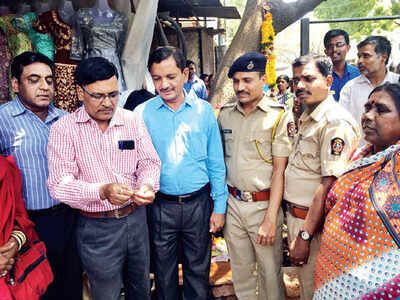Watch: Science tackles illegal shrine at Laxmi Nagar

PIC: NIKHIL GHORPADE
After rumours in the area, fuelled by godmen, spread supersition , scientists from MPKV and a cop convinced locals against markings being a miracle; latter then demolished small temple themselves
While the demolition of illegal shrines remains a contentious topic between the civic administration, law enforcement, politicians and citizens, the timely intervention of a band of scientists and a policeman managed to prevent the construction of such an unauthorised holy structure near the Laxmi Nagar area of Yerwada this weekend. A scientific presentation by Mahatma Phule Krushi Vidyapeeth (MPKV) researchers with the help of a junior cop ofYerwada police station convinced the citizens of stark realities, after which they themselves demolished the temple.
It all began last week, when locals spotted some kaudi (shell) marks on the trunk of a mango tree near the local Urdu school. Assuming it to be the mark of a goddess, they began worshipping the spot in awe. Adonation box was also placed at the tree, and enough alms collected to build a small temple.


When Yerwada police found out about this development, they also spotted the movement of godmen around the area. To tackle this, they summoned scientists from MPKV, who early on Saturday evening conducted a demonstration to prove the markings were no miracle, but simply a cocoon of insects stuck to the trunk. Realising the facts, the locals themselves removed the partially constructed temple.
Sub-inspector Anand Sable, who is in charge of Laxmi Nagar chowky, said, “The rumours spread fast when people saw that the 15-year-old tree, which had never borne fruit, had this year produced a bunch of mangoes. This is when the ‘kaudi’ markings were also seen. Godmen were also called in to conduct special ‘jagran’ and ‘gondhal’ events at night, creating a huge inconvenience to most residents. We noticed a large gathering of devotees and construction activity at the temple along with the donation box. I tried to convince the people about this being mere superstition, but they were not ready to listen. Within days, Rs 10,000 was gathered. Alarmed by what could happen, we sought the help of scientists.

He added, “The group of three scientists from MPKV includedhorticulture professors Vinay Supe, SR Lohate and soil scientist Pramod Jagtap. They effectively explained how these markings were actually insect cocoons, and people were convinced. Demolition work was done by locals themselves.”
Jagtap shared, “We spoke to the people about the insects. They are not common to this area, which is also perhaps why locals encountered them for the first time and believed in rumours. These insects are actually parasites on mango trees and extract their nutrition. We practically showed them the cocoon and explained the logic of how it is made.”
Local resident Rajabhau Dhate shared, “The rumours spread rapidly around our area. We believed in the presence of kaudis on the tree. Local godmen also informed us that this is the miracle of a goddess and need to worship her to avoid her anger. Now, we are happy to laugh at ourselves.”
While the demolition of illegal shrines remains a contentious topic between the civic administration, law enforcement, politicians and citizens, the timely intervention of a band of scientists and a policeman managed to prevent the construction of such an unauthorised holy structure near the Laxmi Nagar area of Yerwada this weekend. A scientific presentation by Mahatma Phule Krushi Vidyapeeth (MPKV) researchers with the help of a junior cop of
It all began last week, when locals spotted some kaudi (shell) marks on the trunk of a mango tree near the local Urdu school. Assuming it to be the mark of a goddess, they began worshipping the spot in awe. A
Watch: How science came to the rescue of Pune Police to tackle encroachment
01:06


When Yerwada police found out about this development, they also spotted the movement of godmen around the area. To tackle this, they summoned scientists from MPKV, who early on Saturday evening conducted a demonstration to prove the markings were no miracle, but simply a cocoon of insects stuck to the trunk. Realising the facts, the locals themselves removed the partially constructed temple.
Sub-inspector Anand Sable, who is in charge of Laxmi Nagar chowky, said, “The rumours spread fast when people saw that the 15-year-old tree, which had never borne fruit, had this year produced a bunch of mangoes. This is when the ‘kaudi’ markings were also seen. Godmen were also called in to conduct special ‘jagran’ and ‘gondhal’ events at night, creating a huge inconvenience to most residents. We noticed a large gathering of devotees and construction activity at the temple along with the donation box. I tried to convince the people about this being mere superstition, but they were not ready to listen. Within days, Rs 10,000 was gathered. Alarmed by what could happen, we sought the help of scientists.

.
He added, “The group of three scientists from MPKV included
Jagtap shared, “We spoke to the people about the insects. They are not common to this area, which is also perhaps why locals encountered them for the first time and believed in rumours. These insects are actually parasites on mango trees and extract their nutrition. We practically showed them the cocoon and explained the logic of how it is made.”
Local resident Rajabhau Dhate shared, “The rumours spread rapidly around our area. We believed in the presence of kaudis on the tree. Local godmen also informed us that this is the miracle of a goddess and need to worship her to avoid her anger. Now, we are happy to laugh at ourselves.”
FROM AROUND THE WEB
GALLERIES View more photos











































Recent Messages ()
Please rate before posting your Review
SIGN IN WITH
Refrain from posting comments that are obscene, defamatory or inflammatory, and do not indulge in personal attacks, name calling or inciting hatred against any community. Help us delete comments that do not follow these guidelines by marking them offensive. Let's work together to keep the conversation civil.